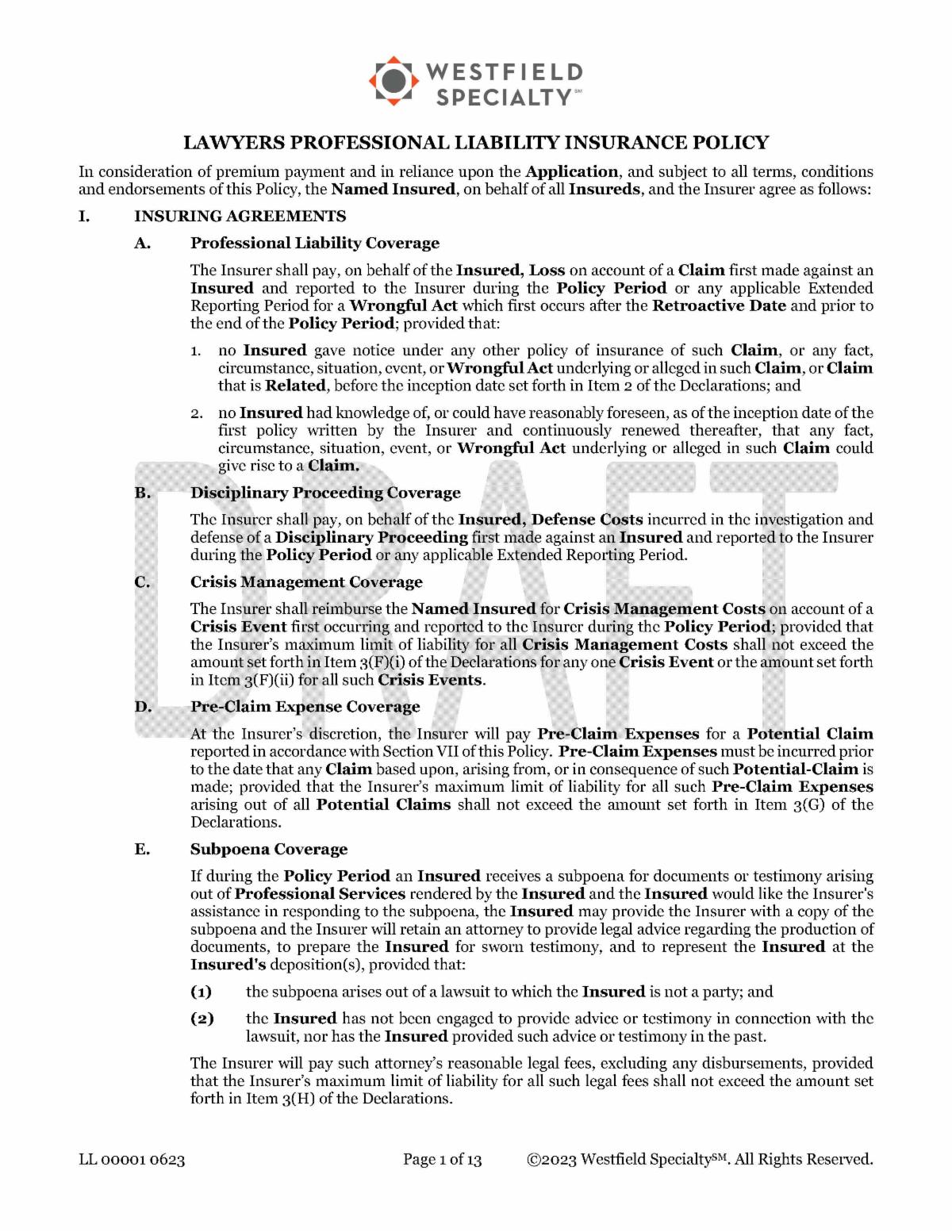
Attorney Malpractice Insurance Policies are claims-made and reported policies. When the coverage ends the ability to report claims for past acts ends at policy termination. Attorneys leaving private practice via retirement, becoming a judge or working in the private or public sector need to protect their past acts. Insurers will not renew attorney malpractice policies for attorneys that are no longer in private practice. Given this it is important for attorneys to protect their past acts once coverage ends. For solo practitioners and small firms that may close once the practitioner leaves, the nonpracticing Extended Reporting Period Endorsement/Retirement Tail (ERP) may be an answer.
Note: For attorneys closing or leaving their small firm to work at another law firm the nonpracticing Extended Reporting Period Endorsement/Retirement Tail (ERP) is not an option. Coverage for their past acts is outside of the scope of this blog.
Each insurer’s policy differs on requirements and wording for obtaining this valuable ERP endorsement at no or reduced cost. Careful planning by the attorney may save the attorney thousands of dollars. The ability to request an ERP differs by insurer but is time sensitive. Regardless of the insurer, the attorney must completely stop private practice to obtain the nonpracticing ERP.
The Westfield policy provides a nonpracticing ERP based on the following policy language:
IX EXTENDED REPORTING PERIODS
Coverage for any Extended Reporting Period under this Policy shall apply solely to Claims first made or Disciplinary Proceedings first commenced during the Extended Reporting Period; and reported pursuant to Section VII but only for any Wrongful Act taking place on or after the Retroactive Date and prior to the end of the Policy Period.
C. Insured Person Extended Reporting Period
(1) If during the Policy Period, any Insured Person permanently ceases performance of Professional Services as a result of retirement, becoming disabled, or death, such Insured Person or the Named Insured, or the Insured Person’s executor or estate, may request an Insured Person Extended Reporting Period Endorsement (the “Endorsement”) to apply to such Insured Person; provided that, at the time this right is exercised by or on behalf of an Insured Person, such Insured Person’s right to practice law has not been revoked, suspended, or surrendered at the request of any regulatory authority for reasons other than that the Insured Person is disabled.
(2) Any request for the Endorsement must be made in writing to the Insurer during the same Policy Period that the Insured Person retired, became disabled, or died, or within sixty (60) days following the termination of such Policy Period, and include evidence of such retirement, disability, or death.
(3) The Endorsement will not apply to any Claims made or Disciplinary Proceeding commenced while this Policy is in force, any successive renewal of this Policy is in force, or any other Extended Reporting Period that applies to this Policy or any renewal of this Policy is in force, nor will it apply to any Claim to which any other insurance applies.
(4) The Limits of Liability applicable to any Claim covered under such endorsement will be shared by all Insured Persons for whom such endorsement has been requested in any one Policy Period.
(5) There is no charge for the Endorsement for eligible Insured Persons who retire, die or become disabled during the Policy Period and who permanently cease performance of Professional Services However, there will be an additional charge for an Insured Person Extended Reporting Period Endorsement for an eligible Insured Person of Named Insured that is a sole proprietorship who retires during the Policy Period, unless the Named Insured has been continuously insured by the Insurer or any of its affiliated insurance companies for at least three (3) consecutive years.
D. Limit of Liability
Except as agreed in an Insured Person Extended Reporting Period Endorsement, the Limit of Liability for any Extended Reporting Period shall be the remaining portion, if any, of the applicable Limits of Liability for the Policy Period. Such limits shall be part of, and not in addition to, the applicable Limits of Liability for the Policy Period. The purchase of the Extended Reporting Period shall not increase or reinstate any applicable Limit of Liability.
III. DEFINITIONS
G. Insured means the Named Insured, any Predecessor Firm, and any Insured Person.
H. Insured Person means any natural person who was, now is, or shall become:
(1) a partner, owner, director, officer, principal, shareholder, member, member of the board of managers, or principal of the Named Insured;
(2) associate, “counsel”, or “of counsel” of the Named Insured and designated as such;
(3) compensated by the Named Insured through wages, salary, or commissions and whose labor or service is directed by the Named Insured, including paralegals and legal paraprofessionals, whether such labor or service is on a part-time, temporary, seasonal, or full-time basis;
(4) a volunteer whose labor or service is directed by the Named Insured; and
(5) contracted to perform work for the Named Insured or independent contractors for the Named Insured, but only if prior to any Claim against such natural person the Named Insured has agreed in writing to indemnify such natural person for matters within the scope of coverage of this Policy.
Insured Person includes the natural persons acting in the capacities described in Paragraphs (1) through (5) above for a Predecessor Firm.
J. Named Insured means the person or entity identified in Item 1 of the Declarations
Switching insurers near retirement to save a few dollars may cost an insured attorney thousands of dollars to buy the same protection. Planning retirement or a transition out of private practice should be discussed with your malpractice insurance agent prior to ending private practice when possible.
CLICK HERE TO OBTAIN AN ATTORNEY MALPRACTICE QUOTE

Lee Norcross, MBA, CPCU
(616) 940-1101 Ext. 7080